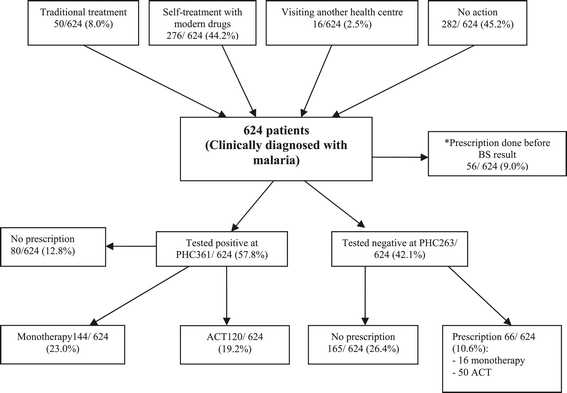Malaria policies versus practices, a reality check from Kinshasa, the capital of the Democratic Republic of Congo
- PMID: 25885211
- PMCID: PMC4396810
- DOI: 10.1186/s12889-015-1670-0
Malaria policies versus practices, a reality check from Kinshasa, the capital of the Democratic Republic of Congo
Abstract
Background: Artemisinin-based combination therapy (ACT) following a confirmed parasitological diagnosis is recommended by the World Health Organization (WHO) and the Congolese National Malaria Control Program (NMCP). However, commitment and competence of all stakeholders (patients, medical professionals, governments and funders) is required to achieve effective case management and secure the "useful therapeutic life" of the recommended drugs. The health seeking behaviour of patients and health care professionals' practices for malaria management were assessed.
Methods: This was an observational study embedded in a two-stage cluster randomized survey conducted in one health centre (HC) in each of the 12 selected health zones in Kinshasa city. All patients with clinical malaria diagnosis were eligible. Their health seeking behaviour was recorded on a specific questionnaire, as well as the health care practitioners' practices. The last were not aware that their practices would be assessed.
Results: Six hundred and twenty four patients were assessed, of whom 136 (21.8%) were under five years. Three hundred and thirty five (55%) had taken medication prior to the current consultation (self -medication with any product or visiting another HC) of whom 47(14%) took an antimalarial drug, and 56 (9%) were treated presumptively. Among those, 53.6% received monotherapy either with quinine, artesunate, phytomedicines, sulfadoxine-pyrimethamine or amodiaquine. On the other side, when clinicians were informed about laboratory results, monotherapy was prescribed in 39.9% of the confirmed malaria cases. Only 285 patients (45.7%) were managed in line with WHO and NMCP guidelines, of whom 120 (19.2%) were prescribed an ACT after positive blood smear and 165 (26.4%) received no antimalarial after a negative result.
Conclusion: This study shows the discrepancy between malaria policies and the reality on the field in Kinshasa, regarding patients' health seeking behaviour and health professionals' practices. Consequently, the poor compliance to the policies may contribute to the genesis and spread of antimalarial drug resistance and also have a negative impact on the burden of the disease.
Figures
References
-
- WHO . World Malaria Report 2011. Geneva: World Health Organization; 2011.
-
- WHO . Guidelines for the treatment of malaria. Geneva: World Health Organization; 2010. - PubMed
-
- WHO . World Malaria Report 2008. Geneva: World Health Organization; 2008.
Publication types
MeSH terms
Substances
LinkOut - more resources
Full Text Sources
Other Literature Sources
Medical


